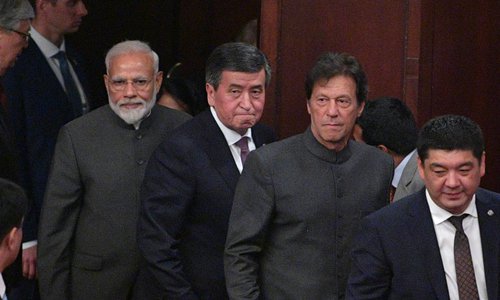HOME >> OPINION
West deliberately ignores SCO’s contribution to peace, development
By Chen Yu Source:Global Times Published: 2019/6/17 18:38:39

Photo: VCG
Chinese President Xi Jinping attended the 19th Heads of State Council Meeting of the Shanghai Cooperation Organization (SCO) in Bishkek, Kyrgyzstan, on June 14. In his speech, Xi proposed building the organization into a model organization of international relations amid a changing global milieu.Since its establishment in 2001, the SCO has taken strides in facilitating cooperation in various fields. The organization now has eight members, four observer states and six dialogue partners.
However, opinion in the West hasn't paid heed to the SCO's achievements. It bad-mouths the organization and believes that after new states join the SCO, differences in values and systems among members will lead to numerous contradictions within the group, leading to its collapse.
The progress the SCO has made in recent years proves how untenable such views are.
It is true that there are conflicts between two new member states, India and Pakistan. However, the organization can help the two neighbors bridge differences and contribute to regional security and cooperation.
First, the SCO offers more meeting opportunities for leaders, diplomats and military officials of the two countries.
Other SCO member states have also made their own contribution to helping improve relations between India and Pakistan.
For example, when India-Pakistan ties soured earlier this year, Chinese Vice Foreign Minister Kong Xuanyou paid a visit to Islamabad in March, trying to help ease tensions between the strained neighbors.
Second, security cooperation within the SCO can help New Delhi and Islamabad to build consensus. Since the establishment of the SCO, member states have made significant achievements in security cooperation both in traditional domains as well as non-traditional areas like counter-terrorism and anti-drug operations.
The Afghanistan situation is a highlight of SCO security cooperation. The meeting of the SCO-Afghanistan Contact Group at the level of deputy foreign minister has been held for three consecutive years.
During this summit, a road map for further steps by the SCO-Afghanistan Contact Group was signed. The road map is aimed at forging consensus, developing collaboration and contributing to peace and development in Afghanistan.
India and Pakistan have a huge interest in such security cooperation. In fact, since they joined the SCO, the two neighbors have participated in security cooperation, which helps both nations develop areas of interest and seek ways to fostering peace.
India and Pakistan are important stakeholders in the Afghan situation and counter-terrorism. With the two nations within its fold, the SCO can carry out regional security cooperation with greater flexibility, so as to promote regional and global peace and development.
Turning a blind eye to the SCO's contribution to peace and development in the Eurasian region, Western public opinion tries to show that the goal of the organization is to build hegemony and confront the West in the region. This misplaced belief is rooted in the Western zero-sum mind-set and a lack of understanding of the organization.
Currently, SCO member states account for about 20 percent of the global economy and 40 percent of world population.
In terms of both size and role, the organization can be regarded as an important platform for promoting multilateralism. The Shanghai Spirit that encompasses mutual trust, mutual benefit, equality, mutual consultations, respect for cultural diversity and a desire for common development, and multilateralism is the reason why the SCO has continuously grown and become an epitome of regional peace and cooperation.
These concepts are opposite to how the West thinks and go against protectionism and unilateralism. Amid growing global uncertainty, the SCO's commitment to the Shanghai Spirit is particularly commendable. In the future, the SCO will continue to devote itself to multilateralism and promoting fairer and more reasonable international relations in politics, trade, economy and security.
The author is an assistant research fellow at the Institute of Eurasian Studies of China Institutes of Contemporary International Relations. opinion@globaltimes.com.cn
Posted in: ASIAN REVIEW